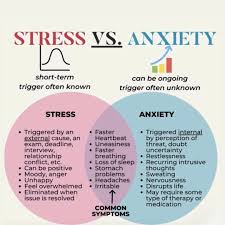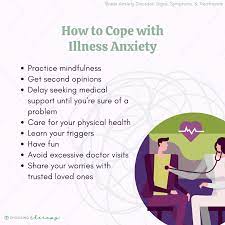Symptoms of Stress and Anxiety
Stress and anxiety are common experiences for many people, especially in today’s fast-paced world. While a certain level of stress can be beneficial in motivating us to take action, chronic stress and anxiety can have serious impacts on our physical and mental well-being. Recognizing the symptoms of stress and anxiety is the first step towards managing these conditions effectively.
Physical Symptoms:
- Headaches or migraines
- Muscle tension or pain
- Fatigue or low energy
- Insomnia or disrupted sleep patterns
- Rapid heartbeat or palpitations
- Digestive issues such as stomach pain, bloating, or diarrhea
Emotional Symptoms:
- Feeling overwhelmed or out of control
- Irritability or mood swings
- Constant worrying or racing thoughts
- Difficulty concentrating or making decisions
- Feeling tense, nervous, or on edge
- Panic attacks or feelings of impending doom
Behavioral Symptoms:
- Avoiding social situations or responsibilities
- Increased use of substances like alcohol or drugs to cope
li><
li>Eating more or less than usual
li><
li>Nail biting, pacing, fidgeting
li><
li>Sleeping too much
li><
ul >
p > It is important to seek help if you experience persistent symptoms of stress and anxiety. Professional support from therapists, counselors, or healthcare providers can help you develop coping strategies and manage these conditions effectively. Remember that you are not alone in your struggles, and reaching out for help is a sign of strength.
body >
html>
9 Key Signs of Stress and Anxiety You Shouldn’t Ignore
- Feeling constantly worried or on edge
- Difficulty concentrating or racing thoughts
- Irritability or mood swings
- Physical symptoms like headaches or muscle tension
- Changes in appetite, either eating more or less than usual
- Trouble sleeping, either insomnia or excessive sleepiness
- Avoiding social situations or activities you once enjoyed
- Feeling overwhelmed or unable to cope with daily tasks
- Panic attacks, including shortness of breath and heart palpitations
Feeling constantly worried or on edge
Feeling constantly worried or on edge is a common symptom of stress and anxiety that can significantly impact one’s daily life. This persistent sense of unease can make it challenging to focus, relax, or engage in activities without feeling overwhelmed. It may lead to racing thoughts, difficulty making decisions, and an overall feeling of tension. Recognizing this symptom is crucial in taking steps to manage stress and anxiety effectively. Seeking support from mental health professionals, practicing relaxation techniques, and incorporating self-care activities into your routine can help alleviate these feelings of constant worry and edginess.
Difficulty concentrating or racing thoughts
When experiencing symptoms of stress and anxiety such as difficulty concentrating or racing thoughts, individuals may find it challenging to focus on tasks or make decisions. Racing thoughts can feel overwhelming, leading to a sense of mental chaos and an inability to quiet the mind. This symptom can interfere with daily functioning, causing distress and frustration. Seeking support from mental health professionals or practicing mindfulness techniques may help in managing these symptoms effectively and promoting a sense of calm and clarity in thought processes.
Irritability or mood swings
Irritability or mood swings are common symptoms of stress and anxiety that can significantly impact daily life. Individuals experiencing these symptoms may find themselves easily agitated, snapping at others, or feeling emotionally unstable. Recognizing and addressing these signs is crucial in managing stress and anxiety effectively. Seeking support from a mental health professional or practicing relaxation techniques can help individuals better cope with irritability and mood swings, ultimately improving their overall well-being.
Physical symptoms like headaches or muscle tension
Physical symptoms such as headaches or muscle tension are common indicators of stress and anxiety. When our bodies are under pressure, it often manifests in physical discomfort. Headaches can be a result of increased muscle tension in the neck and shoulders, while muscle tension itself can lead to aches and pains throughout the body. Recognizing these physical signs is crucial in addressing the root causes of stress and anxiety, as managing these symptoms can help improve overall well-being and quality of life.
Changes in appetite, either eating more or less than usual
Changes in appetite, such as eating more or less than usual, can be a common symptom of stress and anxiety. Some individuals may turn to food for comfort during times of heightened stress, leading to increased consumption and potential weight gain. On the other hand, others may experience a loss of appetite due to feelings of nervousness or tension, resulting in decreased food intake and potential weight loss. Monitoring changes in appetite can provide valuable insights into one’s emotional well-being and serve as a signal to address underlying stressors or seek support to manage anxiety effectively.
Trouble sleeping, either insomnia or excessive sleepiness
One common symptom of stress and anxiety is trouble sleeping, which can manifest as either insomnia or excessive sleepiness. When experiencing high levels of stress, the mind and body can struggle to relax, leading to difficulty falling asleep or staying asleep throughout the night. On the other hand, some individuals may find themselves sleeping excessively as a way for their bodies to cope with the overwhelming feelings of anxiety. Both insomnia and excessive sleepiness can further exacerbate stress and anxiety levels, creating a cycle that negatively impacts overall well-being. It is important to address these sleep disturbances as part of a comprehensive approach to managing stress and anxiety effectively.
Avoiding social situations or activities you once enjoyed
Avoiding social situations or activities that you once enjoyed can be a clear indicator of underlying stress and anxiety. When feelings of overwhelm or unease start to impact your desire to engage in previously enjoyable activities, it may be a sign that your mental well-being needs attention. It’s essential to recognize these changes in behavior and seek support to address the root causes of your discomfort. By acknowledging and addressing these symptoms early on, you can take proactive steps towards managing stress and anxiety effectively.
Feeling overwhelmed or unable to cope with daily tasks
Feeling overwhelmed or unable to cope with daily tasks is a common symptom of stress and anxiety that many individuals experience. When the demands of daily life feel insurmountable, it can lead to feelings of helplessness and frustration. This sense of being overwhelmed can impact one’s ability to concentrate, make decisions, and effectively manage responsibilities. It is important to recognize these signs early on and seek support to develop healthy coping mechanisms to navigate through challenging times.Ignoring these feelings can exacerbate stress and anxiety levels, ultimately affecting both mental and physical well-being.
Panic attacks, including shortness of breath and heart palpitations
Panic attacks can be overwhelming experiences characterized by sudden and intense feelings of fear or anxiety. Symptoms such as shortness of breath and heart palpitations are common during panic attacks, making the person feel like they are losing control or having a heart attack. It’s important to recognize these signs and seek support to manage panic attacks effectively. Understanding the triggers and learning coping mechanisms can help individuals navigate through these challenging moments with greater ease and control.




